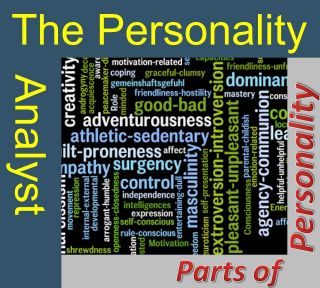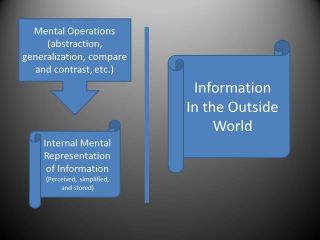Intelligence
Personal Intelligence Inside and Out
We think about our inner representations of the outer world.
Posted March 11, 2014

What does it take to reason accurately about our own personalities and those of other people? In part, we need to recognize information about personality from the outside world, represent that information within our minds, and reason with it validly.
Information in the Outside World
An intelligence arises, evolutionarily-speaking, when there is something in the outside world it would help us to know about. The power to reason is a key means by which we survive and thrive in the world; we grapple with the reality around us and each human intelligence arises to promote our ability to do so. Imagine if there were no relevant outside reality: In such a case, the intelligences would be useless, they never would have evolved, and there would be no faculty of reasoning to care about.
But intelligences are useful and there exists a real outside world. There are many objects we recognize and reason about: a tree, a rock, a building, a person. Our different intelligences help us to think about these objects. Spatial intelligence concerns the spatial relations among objects—seeing a rock, its shape and its trajectory as we skim it across the water. Our evolutionary ancestors used their spatial abilities to choose the better stones to step upon as they crossed a stream or to more accurately throw a spear at an animal that they pursued during a hunt.

Our Inner Representations: Perception and Organization in Memory
When we perceive important information in our environment, we begin to represent that information within ourselves, in memory. By necessity, our inner representations diverge from the reality of what lies outside of us: Reality is too complex for us to grasp and remember in its entirety. Rather, we extract key elements of what we encounter. For example, when we remember a conversation it’s rare that we recall every word. Instead, we remember the gist of what the individual said. Encoding the meaning in our memory begins a process of simplifying information so we can manage it—stripping away the superfluous parts and attending to what we find important. (We don’t always succeed—we may neglect part of a conversation and later discover another person remembered a portion of the exchange very differently).
We represent what we regard as important in our memory so that we can think about it for a while. Without these memories we would have to think about the speaker’s words during the time the utterance took place—with key sentences spoken in just a few seconds. To reason and puzzle out events as they happen, we’d need to think at an inhumanly fast speed.
Mental Operations on Perceived and Remembered Material
Once we have stored the material, we reason with it. In the case of verbal material, we examine the sequence of a person’s argument: what the person was trying to communicate and whether it makes sense to us, and whether we need to respond to it.
Some people’s capacity to reason in a given area is better than others—in the case of language, they have a broader, more discerning vocabulary, better sensitivity to complex syntax, and a deeper ability to understand a speaker’s intentions relative to others. When a person’s capacity to think about a particular area is highly skilled—accurately representing the relevant meanings and using them rationally—we call the individual intelligent in the given area.
Personal Intelligence and Information about Personality
In the case of personal intelligence, we reason about human personality—a person’s organization of her major psychological functions: her motives and emotions, knowledge, action-planning, and self-management.
The personality-related information in the outside world often includes a person’s immediately-recognizable demographics including his age and gender, his chosen location such as walking on the street or riding in a jeep, his manner of dress including whether it’s fashionable, comfortable, or includes such signifiers as sports-team emblems or religious jewelry, and longer term patterns of behavior including repeated styles of speech, nonverbal acts, and patterns of behavior such as listening, appearing to ignore people, or talkativeness.
As we notice this personality-relevant information, we start to encode it in memory, creating a model of a given person. As with most external realities, we can’t store everything, so we label patterns we recognize—extraverts, disagreeable people, and so forth. Over time, we know, an extravert will seek out and attend more social gatherings, engage in more conversation, and generally enjoy the company of lively groups of people more than an introvert. Over time, a disagreeable person will make more sarcastic, critical remarks, observe negative qualities in others, and make known her often-opposing viewpoints more often than will an agreeable person.
Some people are highly observant of others. Lauralee Summer, now an educator in Boston, wrote a memoir rich with descriptions of her perceptions of key people in her life, particularly her mother. Summer was sometimes homeless during her childhood—a consequence, in part, of her mother’s eccentricities. Despite such challenges, Summer excelled academically and went on to attend Harvard University.
Once, while Lauralee was a middle school student in Astoria, Oregon, she and her mother veered off a sidewalk onto a steep hill overlooking the Columbia River and looked at some worms on the ground. When two school friend passed by, they asked what she and her mother were doing. “Looking at worms,” Lauralee replied, and her friends laughed and elbowed each other. “Looking at worms!” they exclaimed. Lauralee concluded from such encounters that her mother was a bit eccentric.
Personal Intelligence and Reasoning about Information
Lauralee, like the rest of us, was drawing information about personality from the outside world and remembering and representing it, so that she could think about it. Sometimes, our reasoning about what we have seen may begin with questioning our inner perceptions of personality. In the case of looking at worms, Lauralee guessed her friends were laughing at her and her mom and said, “Don’t pay attention, Ma.”
Lauralee was also learning to predict her mother: She realized her reassurance of her mother was likley unnecessary except perhaps to express support: Her mother was sufficiently independent regarding such social norms so as not to care. Lauralee acknowledged, “Nothing like that ever bothered her.”
Some of our intuitive first impressions about a person can be spot-on; at other times, we miss the mark. By recording our impressions in memory we have the opportunity to view them from different angles, considering various possibilities about a person. We might conclude that the new person at work who dresses nicely and turns down several invitations to go out with coworkers is a cold person. Rethinking, we might wonder whether he is actually shy and self-conscious, and would respond better to an invitation for a one-on-one lunch than for a group outing. Or, we might meet an older man and believe him to be gentle and thoughtful because he reminds us of our father, only to discover he is disagreeable and potentially vengeful. Part of personal intelligence involves collecting clues and reviewing them to come to reasoned anticipations of how a person might behave.
Another aspect of the mental operations we carry out is integrating sometimes-contradictory information about a person. A high school student who is trying to choose his courses for the coming year may hear a variety of information about the economics teacher. Looking back, he may remember that a school-mate of his said the teacher was “mean,” a friend remarked the teacher was “hard to understand when she explains stuff,” and another who said she was a “good instructor.” He may recall yet another classmate stated “She’s a great person, but when she teaches, she goes off on more tangents than in geometry class.”
If the student realizes it was the weaker students among his friends who labeled the teacher mean and hard to understand, and the stronger students who labeled her a good instructor and a great person, he probably can conclude (if he is a stronger student) that he will like this instructor although she may go off topic—and that, more generally, he should be prepared to be challenged in her class.
A Few Further Thoughts
Personal intelligence evolved because there is information about personality in the outside world that we can perceive if we are attentive. People express their personalities in many ways—from where they choose to live, to how they dress, to the patterns of their behavior. The fact that a great deal of information about personality surrounds us doesn’t mean that a personal intelligence had to evolve, but it does suggest that the evolution of skill in this area was likely.
Research in the area of personality psychology does suggest that people reason in this area. My colleagues and I have made a good case, I believe, for a broad intelligence in the area (see here). Yet no matter how smart we are about personality and its related information, human behavior is hard to predict and we’ll surely be wrong much of the time in anticipating what other people do. That said, using personal intelligence to understand our world can help us navigate our social relations—and help us to understand our own selves at the same time.
References
“Looking at worms…” “Don’t pay attention, ma”… “Of course, my mom…” all from p. 31 of Summer, L. (2004). Learning joy from dogs without collars: A memoir. New York: Simon & Schuster.
Copyright © 2014 John D. Mayer




